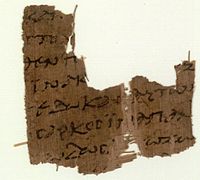

| John 17 | |
|---|---|
 John 17:1-2 on Papyrus 107, written in 3rd century. | |
| Book | Gospel of John |
| Category | Gospel |
| Christian Bible part | New Testament |
| Order in the Christian part | 4 |
John 17 is the seventeenth chapter of the Gospel of John in the New Testament of the Christian Bible. It portrays a prayer of Jesus Christ addressed to his Father, placed in context immediately before his betrayal and crucifixion, the events which the gospel often refers to as his glorification.[1] Methodist theologian Joseph Benson calls this prayer "Our Lord’s Intercessory Prayer", because "it is considered as a pattern of the intercession he is now making in heaven for his people".[2] The New King James Version divides this chapter into three sections:
The book containing this chapter is anonymous, but early Christian tradition uniformly affirmed that John composed this Gospel.[4]

The original text was written in Koine Greek. This chapter is divided into 26 verses.
Some early manuscripts containing the text of this chapter are:
Jesus refers to his Father six times in this chapter, calling God "Father" (Greek: πατηρ, pater), "Holy Father" (Greek: πατηρ ἅγιε, pater hagie, John 17:11) and "Righteous Father" (Greek: πατηρ δικαιε, pater dikaie, John 17:25). These are the only occurrences in the New Testament of the vocative forms αγιε and δικαιε, used in direct address to God.[5]
Alternatively, "After Jesus had spoken these words ..." (to his disciples, in chapter 16),[7] namely:
Benson suggested that "these words" refers to "the words recorded in the three preceding chapters" (chapters 14 to 16).[2]
"Over all flesh" (σαρκός, sarkos), from the noun σὰρξ (sarx),[10] becomes "all people" in the New International Version and the Good News Translation. Alfred Plummer argues that "fallen man, man in his frailty, is specially meant".[11]
The words "in the world" are omitted by the best authorities.[11] Judas' actions fulfill the words of Psalm 41:9:
| Preceded by John 16 |
Chapters of the Bible Gospel of John |
Succeeded by John 18 |
|
| |||||
|---|---|---|---|---|---|
| Bible (New Testament) |
| ||||
| Events (chronological) |
| ||||
| Phrases |
| ||||
| People |
| ||||
| Places |
| ||||
| "I AM" sayings |
| ||||
| Related |
| ||||
| Adaptations |
| ||||
| Manuscripts |
| ||||
| Sources |
| ||||